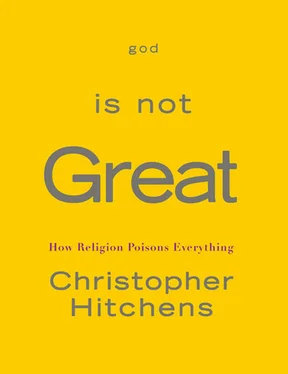When Dr. King’s namesake nailed his theses to the door of Wittenberg Cathedral in 1517 and stoutly announced, “Here I stand, I can do no other,” he set a standard for intellectual and moral courage. But Martin Luther, who started his religious life being terribly frightened by a near-miss lightning strike, went on to become a bigot and a persecutor in his own right, railing murderously against Jews, screaming about demons, and calling on the German principalities to stamp on the rebellious poor. When Dr. King took a stand on the steps of Mr. Lincoln’s memorial and changed history, he too adopted a position that had effectually been forced upon him. But he did so as a profound humanist and nobody could ever use his name to justify oppression or cruelty. He endures for that reason, and his legacy has very little to do with his professed theology. No supernatural force was required to make the case against racism.
Anybody, therefore, who uses the King legacy to justify the role of religion in public life must accept all the corollaries of what they seem to be implying. Even a glance at the whole record will show, first, that person for person, American freethinkers and agnostics and atheists come out the best. The chance that someone’s secular or freethinking opinion would cause him or her to denounce the whole injustice was extremely high. The chance that someone’s religious belief would cause him or her to take a stand against slavery and racism was statistically quite small. But the chance that someone’s religious belief would cause him or her to uphold slavery and racism was statistically extremely high , and the latter fact helps us to understand why the victory of simple justice took so long to bring about.
As far as I am aware, there is no country in the world today where slavery is still practiced where the justification of it is not derived from the Koran. This returns us to the retort delivered, in the very early days of the Republic, to Thomas Jefferson and John Adams. These two slaveholders had called on the ambassador of Tripoli in London to ask him by what right he and his fellow Barbary potentates presumed to capture and sell American crews and passengers from ships using the Strait of Gibraltar. (It is now estimated that between 1530 and 1780 more than one and a quarter million Europeans were carried off in this way.) As Jefferson reported to Congress:
The Ambassador answered us that it was founded on the Laws of the Prophet, that it was written in their Koran, that all nations who should not have answered their authority were sinners, that it was their right and duty to make war upon them whenever they could be found and to make slaves of all they could take as prisoners.
Ambassador Abdrahaman went on to mention the requisite price of ransom, the price of protection from kidnapping, and last but not least his own personal commission in these proceedings. (Religion once again betrays its man-made conveniences.) As it happens, he was quite right in what he said about the Koran. The eighth sura, revealed at Medina, deals at some length with the justified spoils of war and dwells continually on the further postmortem “torments of fire” that await those who are defeated by the believers. It was this very sura that was to be used only two centuries later by Saddam Hussein to justify his mass murder and dispossession of the people of Kurdistan.
ANOTHER GRAND HISTORICAL EPISODE—the emancipation of India from colonial rule—is often portrayed as though it involved a connection between religious belief and ethical outcomes. As with the heroic battle of Dr. King, the real story tends to show that something like the opposite is the case.
After the critical weakening of the British Empire by the First World War, and most particularly after the notorious massacre of Indian protestors at the city of Amritsar in April 1919, it became apparent even to the then controllers of the subcontinent that rule from London would come to an end sooner rather than later. It was no longer a matter of “if” but of “when.” Had this not been the case, a campaign of peaceful disobedience would have stood no chance. Thus Mohandas K. Gandhi (sometimes known as “the Mahatma” in respect for his standing as a Hindu elder) was in a sense pushing at an open door. There is no dishonor in that, but it is exactly his religious convictions that make his legacy a dubious rather than a saintly one. To state the matter shortly: he wanted India to revert to a village-dominated and primitive “spiritual” society, he made power-sharing with Muslims much harder, and he was quite prepared to make hypocritical use of violence when he thought it might suit him.
The whole question of Indian independence was interleaved with the question of unity: would the former British Raj be reborn as the same country, with the same borders and territorial integrity, and yet still be called India? To this, a certain rugged faction of Muslims answered “no.” Under British rule they had enjoyed some protection as a very large minority, not to say a privileged one, and they were not willing to exchange this state of affairs for becoming a large minority in a Hindu-dominated state. Thus the sheer fact that the main force for independence—the Congress Party—was dominated by a conspicuous Hindu made conciliation very difficult. It could be argued, and indeed I would argue, that Muslim intransigence would have played a destructive role in any case. But the task of persuading ordinary Muslims to leave Congress and to join with the partitionist “Muslim League” was made much easier by Gandhi’s talk of Hinduism and by the long ostentatious hours he spent in cultish practices and in tending his spinning wheel.
This wheel—which still appears as the symbol on the Indian flag—was the emblem of Gandhi’s rejection of modernity. He took to dressing in rags of his own manufacture, and sandals, and to carrying a staff, and expressing hostility to machinery and technology. He rhapsodized about the Indian village, where the millennial rhythms of animals and crops would determine how human life was lived. Millions of people would have mindlessly starved to death if his advice had been followed, and would have continued to worship cows (cleverly denominated by the priests as “sacred” so that the poor ignorant people would not kill and eat their only capital during times of drought and famine). Gandhi deserves credit for his criticism of the inhuman Hindu system of caste, whereby lower orders of humanity were condemned to an ostracism and contempt that was in some ways even more absolute and cruel than slavery. But at just the moment when what India most needed was a modern secular nationalist leader, it got a fakir and guru instead. The crux of this unwelcome realization came in 1941, when the Imperial Japanese Army had conquered Malaya and Burma and was on the frontiers of India itself. Believing (wrongly) that this spelled the end of the Raj, Gandhi chose this moment to boycott the political process and issue his notorious call for the British to “Quit India.” He added that they should leave it “To God or to Anarchy,” which in the circumstances would have meant much the same thing. Those who naively credit Gandhi with a conscientious or consistent pacifism might wish to ask if this did not amount to letting the Japanese imperialists do his fighting for him.
Among the many bad consequences of the Gandhi/Congress decision to withdraw from negotiations was the opening it gave to Muslim League adherents to “stay on” in the state ministries which they controlled, and thus to enhance their bargaining positions when the moment for independence arrived shortly thereafter. Their insistence that independence take the form of mutilation and amputation, with western Punjab and eastern Bengal hacked away from the national body, became unstoppable. The hideous consequences endure to this day, with further Muslim-on-Muslim bloodbaths in Bangladesh in 1971, the rise of an aggressive Hindu nationalist party, and a confrontation in Kashmir that is still the likeliest provocation for a thermonuclear war.
Читать дальше












